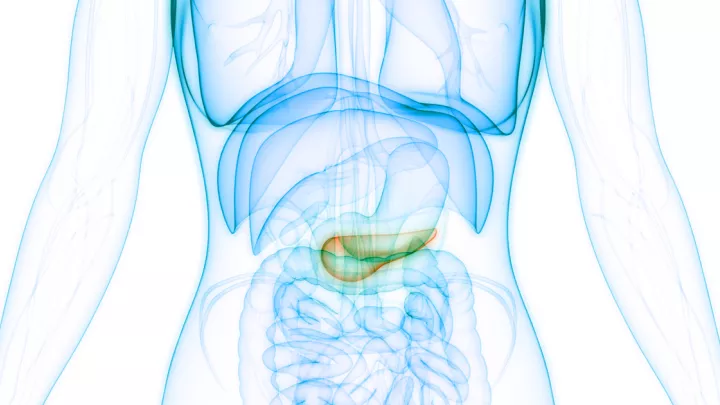Pancreatitis and diabetes: Relationships, causes and risks

Understanding the complex relationship between pancreatitis and diabetes can help patients better manage their health conditions. Sarah Ferguson, BSN, RN, a transplant nurse coordinator, provides expert insight into how these conditions interact and what patients should know.
The pancreatitis-diabetes connection
Pancreatitis occurs when the pancreas becomes injured or inflamed. "Pancreatitis can range from temporary, acute inflammation to permanent damage and development of scar tissue," Ferguson says. Since the pancreas produces insulin, damage to the organ can affect blood sugar regulation.
While pancreatitis can lead to diabetes in some cases, Ferguson emphasizes this isn't always the outcome. "Just because you have these certain types of pancreatitis doesn't mean that you will develop diabetes. Also, most patients with diabetes do not have pancreatitis," she says.
Type 3c diabetes: A direct result of pancreatic damage
One specific form of diabetes linked to pancreatitis is Type 3c diabetes. Ferguson explains, "Type 3c diabetes occurs when there has been damage to the pancreas tissue, and the remaining pancreas cannot make enough insulin to keep up with the body's needs." She adds patients with Type 3c diabetes often experience digestive issues because the damaged pancreas may struggle to produce sufficient digestive enzymes.
The relationship between pancreatitis and different types of diabetes can be more complex than it appears. “There are some patients who can have both Type 3c and Type 2 diabetes,” Ferguson says. “So, diabetes management in patients with pancreatitis isn’t always straightforward or a one-size-fits-all situation.”
Reversibility and treatment
When patients face both pancreatitis and diabetes, some may wonder whether their diabetes can be reversed. "If diabetes is caused by chronic pancreatitis, it usually cannot be reversed because the damage to the pancreas cannot be undone," Ferguson says. However, she notes that temporary blood sugar fluctuations during acute pancreatitis episodes typically return to baseline once the pancreas heals.
Drug-induced pancreatitis
Certain diabetes medications can increase the risk of acute pancreatitis. These include:
- Glucagon-like peptide-1, or GLP-1, drugs.
- Dipeptidyl peptidase 4, or DPP-4, inhibitors.
"If a patient already has pancreatitis, we usually recommend avoiding these medications or stopping them if they are already prescribed,” Ferguson says. “The risk of developing pancreatitis from taking diabetes medications is fairly low, so patients without a history of pancreatitis can expect to take these medications safely.”
Ferguson emphasizes the importance of consulting health care providers about medication concerns rather than stopping a medication on one’s own.
Prevention and management
For those with pancreatitis, Ferguson recommends avoiding smoking and alcohol to prevent further pancreatic damage. She also emphasizes the importance of working with health care providers to develop appropriate management strategies, as diabetes management in patients with pancreatitis can be complicated.
Through proper medical care and lifestyle modifications, most patients with either or both conditions can manage their health effectively without requiring extreme interventions like transplantation.
In fact, Ferguson says pancreas transplantation is rarely necessary. "Pancreatitis is not an indication for pancreas transplant," she says. Transplants are typically reserved for a condition known as brittle diabetes, with life-threatening complications that don't respond to medical management.
Nebraska Medicine pancreatic care
Given the intricate relationship between pancreatitis and diabetes, specialized medical care is key. Ferguson speaks to the advantage of the Nebraska Medicine comprehensive care model, “Our pancreatic care clinic allows patients to have access to all experts in one place to help people with all sorts of complex issues with their pancreas.”
If you or a loved one are experiencing pancreatitis or other pancreatic conditions, the pancreatic care team has the experience and knowledge to deliver the most comprehensive care in the region and has extensive experience treating benign pancreatic disorders. Nebraska Medicine is recognized for outstanding clinical care in pancreatitis by the National Pancreas Foundation.
Treatment is available for conditions such as:
- Acute pancreatitis.
- Chronic pancreatitis.
- Pancreatic cysts.
Nebraska Medicine specialists take a comprehensive approach to pancreatic care. This larger team includes radiology, surgery, oncology, research and genetics experts to review patient cases and develop personalized care plans.
For those outside the Omaha metro, virtual care options are available, including video visits, and the care team can sometimes arrange local testing closer to patients’ homes. Additionally, on-site hotel accommodations are available for patients traveling from out of town.







